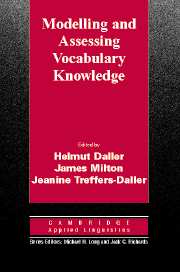Book contents
- Frontmatter
- Contents
- List of contributors
- List of abbreviations
- Acknowledgements
- Foreword
- Series Editors' Preface
- Editors' introduction
- I Fundamental issues
- II Vocabulary and learner differences
- III The unit of assessment and multiple vocabulary measures
- IV Metaphors and measures in vocabulary knowledge
- V Vocabulary measures in use
- Chapter 11 Assessing vocabulary for the purpose of reading diagnosis
- Chapter 12 The best of both worlds? Combined methodological approaches to the assessment of vocabulary in oral proficiency interviews
- Chapter 13 What is in a teacher's mind? Teacher ratings of EFL essays and different aspects of lexical richness
- References
- Appendices
- Index
Chapter 13 - What is in a teacher's mind? Teacher ratings of EFL essays and different aspects of lexical richness
Published online by Cambridge University Press: 04 May 2010
- Frontmatter
- Contents
- List of contributors
- List of abbreviations
- Acknowledgements
- Foreword
- Series Editors' Preface
- Editors' introduction
- I Fundamental issues
- II Vocabulary and learner differences
- III The unit of assessment and multiple vocabulary measures
- IV Metaphors and measures in vocabulary knowledge
- V Vocabulary measures in use
- Chapter 11 Assessing vocabulary for the purpose of reading diagnosis
- Chapter 12 The best of both worlds? Combined methodological approaches to the assessment of vocabulary in oral proficiency interviews
- Chapter 13 What is in a teacher's mind? Teacher ratings of EFL essays and different aspects of lexical richness
- References
- Appendices
- Index
Summary
Introduction and overview
The findings of the present chapter are a contribution to the discussion on the role of lexical richness within the construct of foreign language proficiency. The present study investigates to what extent teacher judgement of EFL essays can be predicted by measuring the lexical richness of these texts. Thirty-one essays from students on English for Academic Purposes (EAP) short courses were analysed with various measures of lexical richness (D, Advanced Types, P-Lex, Guiraud's Index, Advanced Guiraud and Type-Token Ratio (TTR)). Four experienced EFL teachers rated the essays according to a set of band descriptors that was familiar to the teachers, and is also used in EAP exams. The raters were asked to judge the overall proficiency and a number of other linguistic aspects of the texts. Although the teachers did have different individual preferences in the detailed analysis of the essays, there was a highly significant correlation between them, especially on the overall score (rho >.9), which is an indication of reliable rating. Other studies on teacher ratings of oral texts (Richards and Malvern, 2000; Malvern and Richards, 2002; Malvern, Richards, Chipere, and Duran, 2004: 103) suggest that teacher rating is influenced by the use of advanced vocabulary or rare words. The present study confirms this for written texts as well. In line with our expectations this chapter shows that the measures based on the occurrence of infrequent words are most useful in predicting teacher judgement.
- Type
- Chapter
- Information
- Modelling and Assessing Vocabulary Knowledge , pp. 234 - 244Publisher: Cambridge University PressPrint publication year: 2007
- 8
- Cited by

